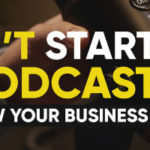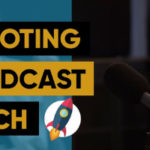Charley: James, this has to be the most common question I get. This is absolutely would be top of the pile. Time and time again, I get people with podcasts, they’re asking, How do I promote my show? And I know this is something you put a lot of effort and attention into. So I’ll ask you, what do you feel have been the most effective ways to promote your show?
James: Sadly, it’s not enough to just do the show and leave it there. It will sit there for a while till people discover it. So, one thing that we do once we record a show is my team load it up to our website, and we hit publish. And thankfully, we get good SEO traffic for it. So, that’s one sort of not as obvious method.
Other things are we start syndicating it across different platforms. So because we have the browser notification on our site, when we publish a new post, it pushes out a little alert to desktop users. And so that’s one nice little way to let people know there’s a new fly in the spider web. Of course, it automatically pushes out across iTunes to people’s devices who are subscribed to the show. And probably something similar happens for other podcatchers and Stitchers.
We make sure we distribute the show in multiple platforms, so it can be easily found like Spotify, SoundCloud. We post it to our Facebook page, we put it on LinkedIn, we post a little teaser. We also put a teaser and updates in our Instagram stories and social media platform. We tweet it, we make little tweetables. And I usually share my shows on my personal Facebook profile, something people might overlook. But unless I’ve got around 5000 people following my personal Facebook profile, so when I post something there, we get an instant reaction.
I recently posted a question about podcast, Charley, because you and I have been having a look at how Valher Media is serving the market. And the reaction we got was like some really solid feedback. But from the people who gave it, are industry leaders. So, those industry leaders, often, if you put something interesting on your feed, they might actually share it. So it’s important to set it to public. And if an industry leader or icon is pushing something out in front of their audience, you can get a whole new catchment of readers. Of course, people who are subscribed to the YouTube channel are getting it.
And really a very important one, and again, maybe overlooked is send an email out to your audience and say, Hey, we’ve got a new show. We also do a weekly wrap for people to say, you know, this went on this week. That’s another way to do it.
And here’s another one. Again, it’s counter-intuitive, but we actually push our podcasts out to my paid customers inside our membership. Because they are my hyper-customers. They are the most invested in my solutions and they like to have a listen. But also, they have the added benefit inside SuperFastBusiness. They can actually ask questions around it. Often they asked me on that. I like that interview, I like how you asked about this, what did you think about that? Or were they hesitant about this? Or why didn’t you ask that? They give me really great refinements on it and extend it and make it a deeper conversation. And the value added goes beyond just being able to listen to it while you’re doing a workout in the gym.
But there are other things you can do. There’s lots of Facebook groups. Often, someone’s asking a question in the Facebook group, and I might have done a podcast with exactly that topic. An example of that is, I was in a business Facebook group and they we’re talking about how to structure deals. And Charley, I actually linked them back to our episode on SuperFastBusiness. In that post where it wouldn’t have been considered an overly promotional link. I didn’t go to that group to spam it. But if I’m answering a specific topic with this specific answer, and sometimes I’ll do it in two steps. I might say, I actually recorded an interview on that topic, and then leave it at that. And then someone will say, Can you share a link? Like, you bet I can pal! Or I might send a private message and then they actually share it because they thought it was so valuable.
Of course, the other thing that you shouldn’t overlook is your guest. If you have a guest on the show, my team actually send out every guest on our show, a link to the show, some tweets they might use, and they might share it with their audience. And often they do. I’ve actually had Scott from WickedReports, always emails his audience with our podcasts whenever we publish. And Jay Abraham generously shares podcast appearances with his audience in an email and on his website. He always ask for a copy of it. So if you get the right guests, they’ll actually do some syndicating and sharing for you, as well.
And then, of course, you can buy ads and do all the cool stuff, as well, once you’ve got things up and running. If you found that your opt-in is very popular or working well or resulting in sales, it might be worth shining a spotlight on that in the form of paid traffic.
Charley: Definitely. I agree with that a lot. You know, so many wins there, James, and so many different ways to do it. But I think you nailed something there. We’ve kind of found for new shows, if you’re really trying to get them kickstarted and get that snowball or that compound interest kicked off, paid traffic has been a phenomenal way to kind of amplify the start of the show.
Also thinking about another one that do it tastefully. Please don’t pester your guest. But if you have a guest on the show, like if they’re going to share it, like that’s a great strategy for cross-promotion.
James: I wouldn’t mandate that they have to. If anyone forces me to share it, I’m not interested. I think, without exception, I’ve shared every social media appearance, every podcast that I’ve been as a guest. I’ve always shared it on my social as a matter of etiquette. But also, it helps me get invited on to other people’s shows which is a benefit to me and to them. If people see that I share shows, they’re more likely to invite me on their show, as well. Every single person whose show I share (there’s a tongue-twister), they get lots of visits, because I’ve got a nice audience of people who trust what I’m sharing.
And it also is good to tell them why it’s interesting. So, if someone interviews me and they get a really interesting story out of me that I’ve never shared before, then I’ll say that in my share. Like, in this interview, I share a story of when I was a debt collector that I’ve never shared before, and the people are going to go over there. And more time in the earbuds with my prospects, the more sales I’m going to make. It’s just a conversion magnifier.
Charley: Isn’t that interesting? And from your perspective, you’re talking about not your own show, but other shows you’ve been on and how much you can get out of sharing that for other people. So I think for people that have got podcasts or shows they’re doing, you know, it just shows how much can be in it for the guests to share why they might want to do it, or reasons that might motivate them.
James: Exactly. And also, this is a bit subtle, but if you happen to have a published book, so I have a book Work Less, Make More on Amazon. I look for what other books show next to my book on Amazon. You know how they have the recommended books? If you like this, you’d like that. I get them on my podcast. So, if my guest happens to share with their audience then now Amazon are making correlations between my book and their book. And everyone who buys their book will most likely be recommended my book because Amazon knows that people who have that book, also like this book. So, you can actually get a book effect by bringing in people in the same category or the same recommendation pool.
And the same goes for podcasts. I’d scroll down on your podcast player, see which other podcasts is iTunes recommending you and make sure you go on those podcasts.
Charley: It’s interesting, what a great source of information or how much information like Amazon and iTunes give us. They pretty much tell us like who are the guests you would like to have on or what are the other shows you want to be associated with.
James: Same with Google, the bottom of the page, the related searches and same for YouTube on the right-hand column that’s showing all the videos they think are similar to what you’re watching right now. So, it’s a very powerful strategy. It’s one of my favorite coaching techniques is like what is very similar or related to this that we could just, you know, move one inch to the side or two and a half centimeters (for the metrically-inclined) and tap into as well without much effort.
Charley: Yeah, I agree with that one, as well, James.









Leave a Reply